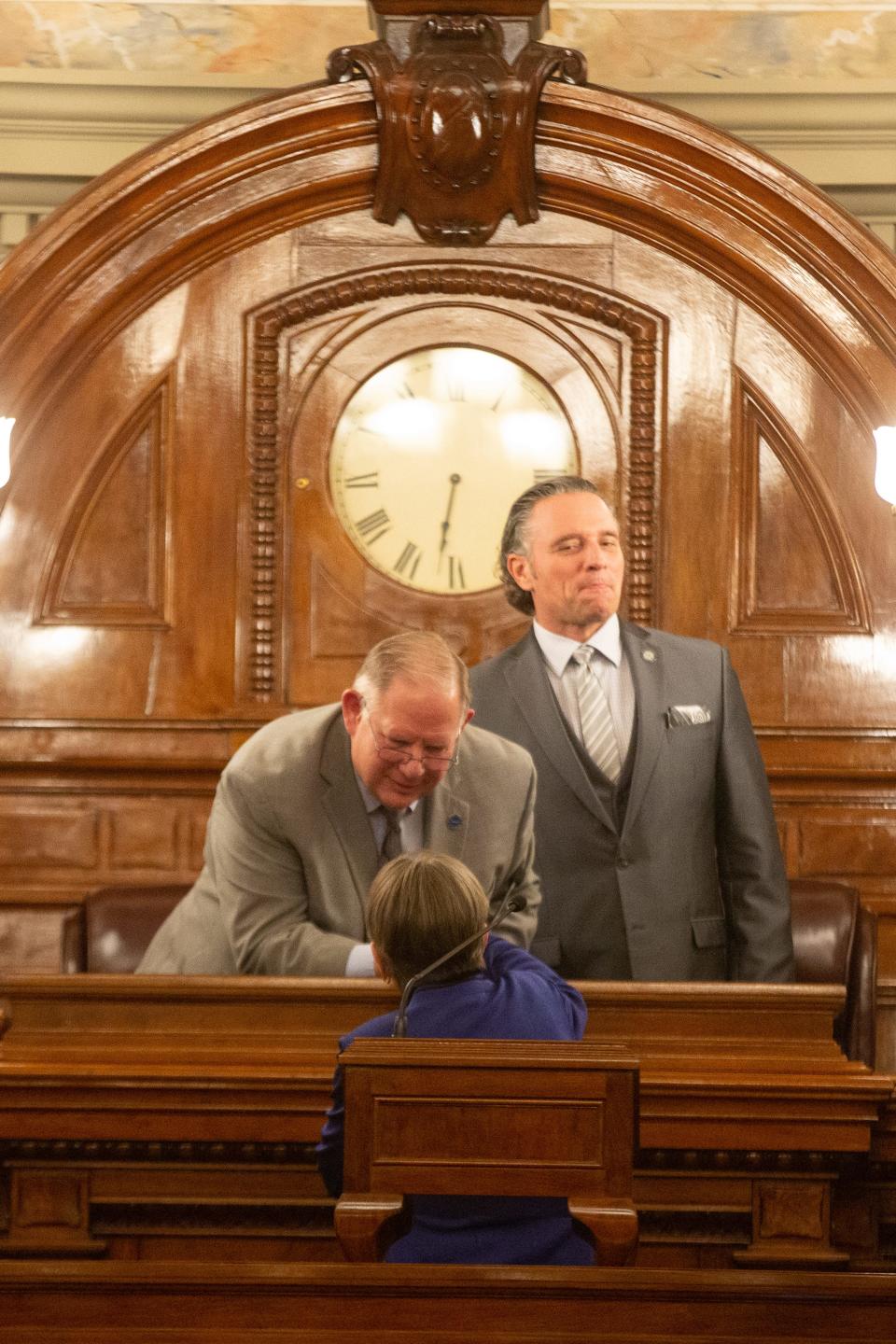Kansas collected $874 million more in tax revenue than expected in fiscal year 2023
- Oops!Something went wrong.Please try again later.
Kansas taxpayers paid more to tax collectors than expected over the past 12 months, and politicians are eyeing tax cuts next year after failing to agree on how to provide tax relief this year.
Taxpayers paid roughly $10.2 billion in taxes to Kansas state government in the past fiscal year, with tax receipts to the State General Fund beating original projections by $874 million, according to newly released data from the Kansas Department of Revenue.
"Time and again, we have seen our monthly collections exceed estimates because of my administration's success in attracting businesses, expanding our workforce, and growing our state's economy," said Gov. Laura Kelly. "This past legislative session, I fought for responsible tax cuts on groceries, property, and Social Security to put this money back in the hands of working Kansans. Come January, I am committed to partnering with legislators to get Kansans relief."

The Democratic governor and the Republican supermajorities in the Legislature failed to agree on tax cuts this spring, with Kelly vetoing a pair of bills.
Politicians will again be looking to provide tax relief with healthy tax revenues fueling budget surpluses and a looming 2024 election for the entire Legislature with GOP supermajorities at stake. The latest budget profile projected a surplus of about $1.9 billion at the end of the fiscal year.
"It's really unfortunate that the Kelly/Toland Administration vetoed the sustainable and comprehensive tax bill this session," said House Speaker Dan Hawkins, R-Wichita. "What should have been a no-brainer with the surplus in tax revenue, tax cuts that would have helped all Kansans instead fell victim to petty politics. Rest assured, the legislature will bring back these cuts next session and passing them will be top priority."
Legislative leadership created a Special Committee on Taxation, which is authorized to meet twice during the interim months before the start of the next legislative session in January. Meeting dates have not yet been scheduled.
"Patrick Mahomes doesn’t give up if he throws a few incompletions — he just gives it his best once again on the next play," said Rep. Adam Smith, R-Weskan and the chair of the interim tax committee. "We will do the same and be persistent until we get a tax-cut win for all Kansas taxpayers!"
Fiscal year 2023 tax revenue beat estimates by $874 million

Kansas entered fiscal year 2023 with a projection of $9.286 billion in total tax revenue.
By the time the Consensus Revenue Estimating Group met four months into the fiscal year, revenue was outpacing estimates. Economists then increased projections for the fiscal year to $10.059 billion. When the group met again this spring, they increased the estimate to $10.134 billion.
The fiscal year ultimately closed on June 30 with $10.160 billion in total taxes collected, or $874 million above the revenue projections at the start of the year.
Individual income taxes were $155 million below estimates.
Corporate income taxes were $855 million above estimates.
Financial institution taxes were $11 million above estimates.
Retail sales and compensating use taxes were $166 million above estimates.
Excise taxes on tobacco, alcohol, and oil and gas hit right around the estimate.
Other taxes, including on insurance premiums, were $3 million below estimates.
Much of the better-than-projected tax revenue is due to corporate income tax collections overperforming. Revenue officials have previously said that is in-part due to it being the state's first tax year under the new SALT Parity law, which allows certain small businesses to pay an employee's individual income tax burden through corporate taxes.
Income and sales taxes are the top sources of tax revenue to the State General Fund. Individual income taxes brought about $4.5 billion, while corporate income taxes brought in about $1.5 billion. Sales and use taxes brought in about $3.6 billion.
Kansas politicians failed to enact tax cuts in 2023
Despite bipartisan agreement that Kansas coffers had plenty of money to afford tax cuts, Republican and Democratic lawmakers couldn't find agreement with the Democratic governor on how to cut taxes.
While some tax policy proposals had bipartisan support, all substantive tax cuts ultimately failed. That's because the governor vetoed two packages of tax cuts after GOP legislative leadership decided to logroll divisive tax cuts with noncontroversial ones.
Republicans made a flat income tax their top priority, but Democrats vehemently opposed moving from the current progressive three tier structure to a single rate. Flip-flopping among Republican senators concerned about how a flat tax would affect the budget and how it provided far more benefit to the rich than to the middle class meant a veto override attempt failed twice.
Also included in that bill were tax cuts for corporations and financial institutions, indexing the standard deduction to inflation, eliminating the Social Security tax cliff, accelerating the food sales tax cut and a property tax cut for homeowners. The proposals in Senate Bill 169 totaled roughly $1.4 billion in tax cuts over three fiscal years.
A second tax cut package was also vetoed, and the Legislature left itself with no time to attempt an override.
That bill's most controversial provision was a tax break designed to benefit Genesis Health Clubs. The Wichita-based chain of gyms has long lobbied for special tax treatment in line with nonprofits and governmental entities while also failing to pay its property tax bills on time.
That bill also included tax cuts for donors to anti-abortion counseling centers, a tax credit for people who adopt, eliminating sales taxes on coupons as well as telecommunications, changes to the homestead program and other tax policy changes. The proposals in Senate Bill 8 totaled $244 million in tax cuts over three fiscal years.
Will Kansas income, sales, property taxes be cut next year?
Republican legislative leaders indicated that income, sales and property tax cut proposals next year will be similar to what was proposed last year.
"Last year, the House passed a sensible plan with bipartisan support that would have done exactly that," Smith said of securing a tax-cut win for all taxpayers, "but a misguided veto and political drama got in the way of reasonable tax cuts. It is my intention to pick right up where we left off last year and propose broad tax relief to as many Kansans as possible through income, sales, and property taxes.
"We will pay close attention to our revenue situation and put together a sustainable and affordable package that will benefit all Kansas taxpayers."
A return to last year's tax proposals could also mean bringing back a Republican push for a more wide-ranging cut to taxes on all forms of retirement income. Such a plan had Senate support, but was pared back to just Social Security benefits because of the cost.
There could also be a revival of competing variations of plans to enact a back-to-school sales tax holiday from Kelly, a Republican senator and a Democratic senator. The idea had bipartisan support, but received little traction amid unresolved disputes over the details, particularly over whether certain clothing should be included.
Kelly could also again propose a one-time income tax rebate. Republicans have never been keen to such proposals from the Democratic governor, ridiculing them as an attempt to buy votes.
This article originally appeared on Topeka Capital-Journal: Kansas collected $874 million extra in taxes while tax cuts failed

